Pegasystems Bundle
How Does Pegasystems Dominate the Enterprise Software Market?
In the cutthroat world of enterprise software, Pegasystems has carved a unique path to success. Its Pegasystems SWOT Analysis reveals a strategic focus on customer experience and intelligent automation, setting it apart from competitors. But what specific sales and marketing strategies fuel Pega's growth and market share?
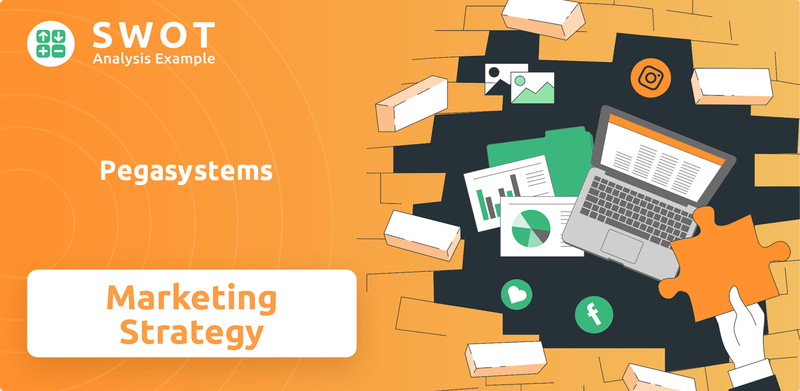
This deep dive into Pegasystems' sales and marketing approach unveils how the company leverages its Pega platform to drive customer engagement and digital transformation. We'll explore the evolution of its go-to-market strategy, from customized solutions to a platform-centric model, and analyze the key elements of its Pega sales and marketing efforts. Understanding these strategies is crucial for anyone seeking to understand the dynamics of the enterprise software landscape and how Pega sales and marketing strategies contribute to its continued success.
How Does Pegasystems Reach Its Customers?
The sales channels employed by Pegasystems are a critical component of its overall Pegasystems sales strategy. The company primarily relies on a direct sales model, complemented by a robust partner ecosystem. This approach allows for a comprehensive market reach, catering to the diverse needs of its enterprise customers.
Pegasystems' sales strategy emphasizes direct engagement with large organizations. This allows the company to deeply understand customer needs and demonstrate the value of its Pega platform. This consultative approach is particularly effective for selling sophisticated and customized solutions.
The evolution of Pegasystems' sales channels shows an increased focus on strategic partnerships. While direct sales remain foundational, the company has expanded its reach through global system integrators (GSIs), specialized consulting firms, and independent software vendors (ISVs). These partnerships enable Pegasystems to extend its market penetration.
Pegasystems' direct sales team focuses on large organizations. They engage directly to understand complex needs and demonstrate the value of the Pega platform. This channel is crucial for handling complex and customized solutions.
Pegasystems leverages partnerships with GSIs, consulting firms, and ISVs. These partnerships extend market reach, especially into new industries and geographies. The partners utilize their existing client relationships and industry expertise.
The company website serves as a key digital channel for lead generation. It provides product information, case studies, and contact forms. While not an e-commerce platform, it supports initial customer engagement.
The performance of sales channels is measured by lead quality, conversion rates, and deal size. Direct sales handle the largest engagements. Partners facilitate broader market coverage and specialized implementations.
Pegasystems'
- Direct sales teams engage with large enterprises to understand their needs.
- Partnerships with GSIs and consulting firms extend market reach.
- The company website is a key digital channel for lead generation.
- Performance is measured by lead quality and conversion rates.
Pegasystems SWOT Analysis
- Complete SWOT Breakdown
- Fully Customizable
- Editable in Excel & Word
- Professional Formatting
- Investor-Ready Format
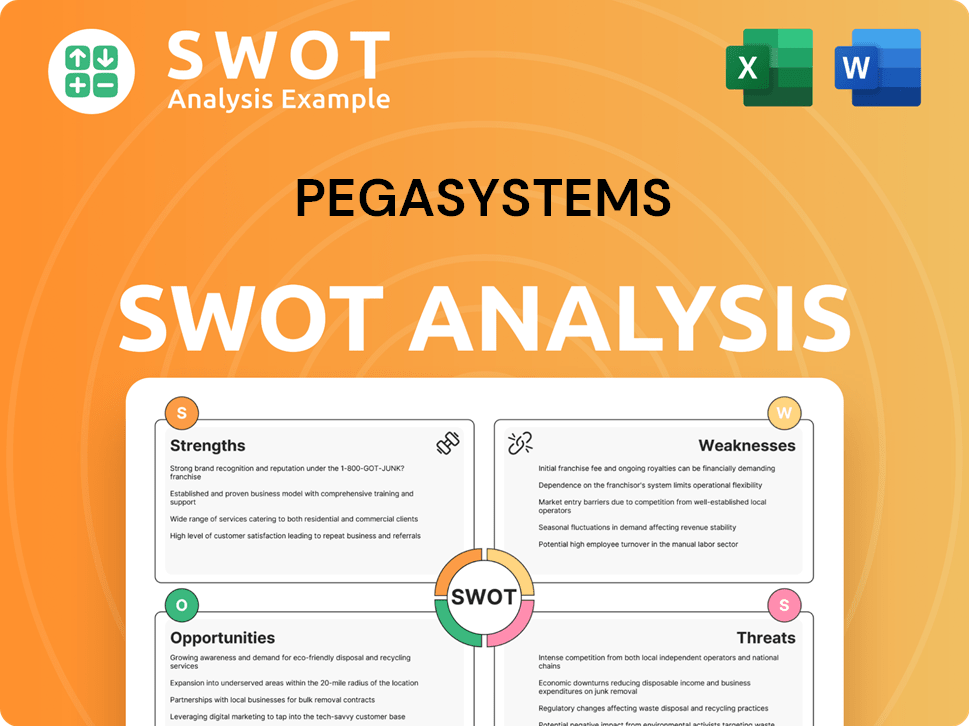
What Marketing Tactics Does Pegasystems Use?
The marketing tactics employed by Pegasystems are designed to establish the company as a leader in the enterprise software market. Their approach combines digital strategies with traditional methods, focusing on building brand awareness, generating high-quality leads, and driving sales. This multi-faceted strategy is crucial for reaching a diverse audience of decision-makers and influencing their purchasing decisions.
Pegasystems' marketing efforts are heavily reliant on content marketing. They produce a wide range of content, including white papers, e-books, webinars, and blog posts, to address industry challenges and position their platform as a solution. This focus on thought leadership helps establish credibility and attract qualified leads, which is essential in the competitive enterprise software space. Furthermore, they leverage data-driven marketing to personalize messaging and optimize campaign effectiveness.
The company's go-to-market strategy also includes participation in major industry events and conferences, providing opportunities for face-to-face interactions with potential clients and partners. These events are vital for showcasing their technology through demonstrations and speaking engagements. This blend of digital and traditional marketing tactics is a key component of their overall strategy.
Content marketing is a cornerstone of the Pega marketing strategy. They produce a wealth of resources, including white papers, e-books, webinars, and blog posts. This approach helps establish credibility and attract qualified leads, which is essential for their business.
SEO plays a vital role in ensuring content discoverability. They also use targeted paid advertising campaigns on platforms like LinkedIn to drive traffic and engagement. These efforts are designed to increase visibility and reach a wider audience.
Email marketing is used for nurturing leads, distributing content, and announcing product updates and events. This allows them to stay connected with potential customers. This helps to maintain engagement and build relationships.
Pega participates in major industry events and conferences. They showcase their technology through demonstrations and speaking engagements. This provides crucial opportunities for face-to-face interaction.
The company utilizes sophisticated customer segmentation for personalized messaging. They also use advanced analytics to track customer journeys and measure campaign effectiveness. This approach helps optimize marketing spend.
Pega emphasizes demonstrating the real-world ROI of its solutions. They often use customer success stories and quantifiable business outcomes. This helps to showcase the value of their offerings.
The Pega marketing strategy is designed to drive customer acquisition and enhance brand recognition. Their approach involves a combination of digital and traditional marketing tactics. The company focuses on generating leads through content and digital channels.
- Content Marketing: Creation of valuable content to attract and engage potential customers.
- SEO and Digital Advertising: Optimizing content for search engines and running targeted advertising campaigns.
- Email Marketing: Nurturing leads and distributing relevant information.
- Industry Events: Participating in conferences to showcase technology and network.
- Data-Driven Marketing: Using customer data to personalize messaging and optimize campaigns.
- ROI Focus: Highlighting the return on investment (ROI) of their solutions through customer success stories.
A comprehensive understanding of the Competitors Landscape of Pegasystems is crucial for refining their marketing strategies. By monitoring competitor activities and market trends, Pega can adapt its tactics to maintain a competitive edge. This includes analyzing pricing strategies, product offerings, and marketing campaigns of key competitors.
Pegasystems PESTLE Analysis
- Covers All 6 PESTLE Categories
- No Research Needed – Save Hours of Work
- Built by Experts, Trusted by Consultants
- Instant Download, Ready to Use
- 100% Editable, Fully Customizable
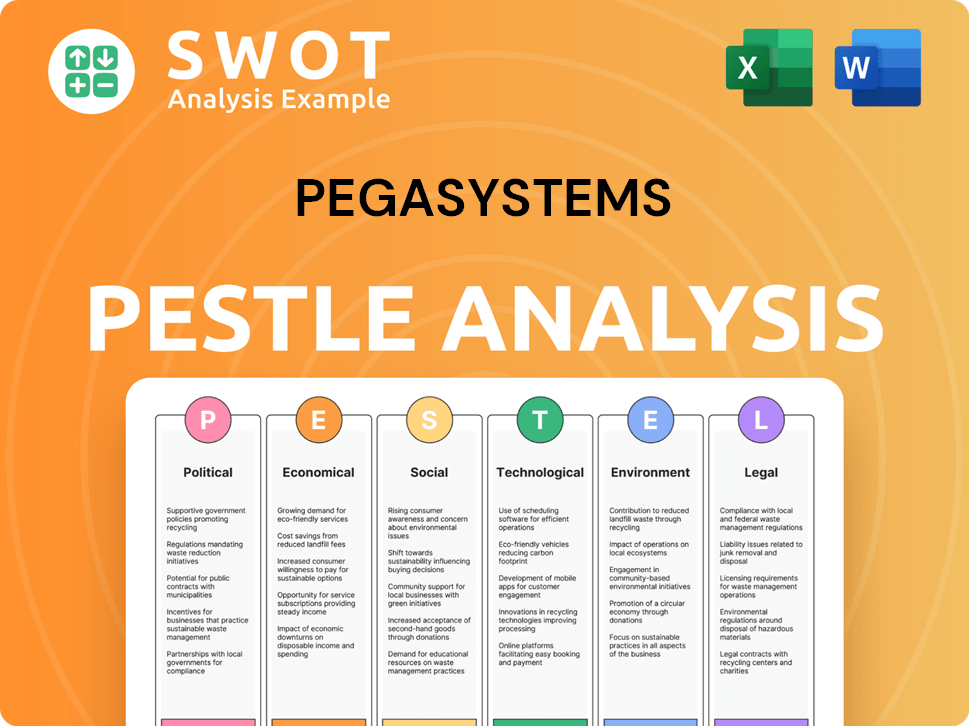
How Is Pegasystems Positioned in the Market?
The brand positioning of Pegasystems, or Pega, centers on its role as a leading provider of an AI-powered decisioning and workflow automation platform. This positioning emphasizes Pega's ability to enable hyper-personalization and operational excellence for its clients. The core message revolves around simplifying, automating, and transforming business processes, customer interactions, and overall enterprise agility.
Pega's visual identity often uses clean, modern aesthetics to convey intelligence, connectivity, and efficiency. Its tone of voice is authoritative and visionary, targeting C-suite executives and IT decision-makers. The company aims to be seen as a trusted partner for digital transformation, focusing on tangible business outcomes and return on investment (ROI) for its clients.
Pega's consistent brand messaging across its website, marketing materials, and industry events reinforces its image as a trusted partner for digital transformation. The company often highlights client success stories and industry awards to validate its brand claims and enhance its perception within the market. This approach is crucial for its Owners & Shareholders of Pegasystems.
Pega's sales strategy focuses on targeting large enterprises, particularly in highly regulated industries. This involves a consultative sales approach, emphasizing the value and strategic advantage of its platform. The sales process often includes detailed demonstrations, proof-of-concept engagements, and close collaboration with clients to ensure successful implementations and ROI.
Pega's marketing strategy uses a multi-channel approach, including digital marketing, content marketing, and industry events. The focus is on thought leadership, showcasing client success stories, and highlighting the platform's capabilities in areas like low-code development and customer engagement. This helps generate leads and build brand awareness among target audiences.
Pega differentiates itself by offering real-time AI decisioning and end-to-end automation capabilities within a unified platform. This approach contrasts with point solutions, allowing Pega to orchestrate complex customer journeys and internal workflows enterprise-wide. This appeals to large enterprises in sectors such as financial services, healthcare, and government.
Pega's customer acquisition strategy involves a combination of direct sales, strategic partnerships, and targeted marketing campaigns. The company focuses on identifying and engaging with key decision-makers within target organizations. Lead generation is supported by content marketing, webinars, and industry events to attract and nurture potential customers.
Pega's approach to sales and marketing is characterized by a focus on value, innovation, and customer success. The company emphasizes its ability to deliver tangible business outcomes and ROI for its clients. This approach is reflected in its sales process, marketing campaigns, and overall brand messaging.
- Consultative Sales: Building relationships and understanding client needs.
- Thought Leadership: Establishing expertise through content and events.
- Strategic Partnerships: Collaborating with other technology providers.
- Customer Success: Ensuring clients achieve desired outcomes.
Pegasystems Business Model Canvas
- Complete 9-Block Business Model Canvas
- Effortlessly Communicate Your Business Strategy
- Investor-Ready BMC Format
- 100% Editable and Customizable
- Clear and Structured Layout
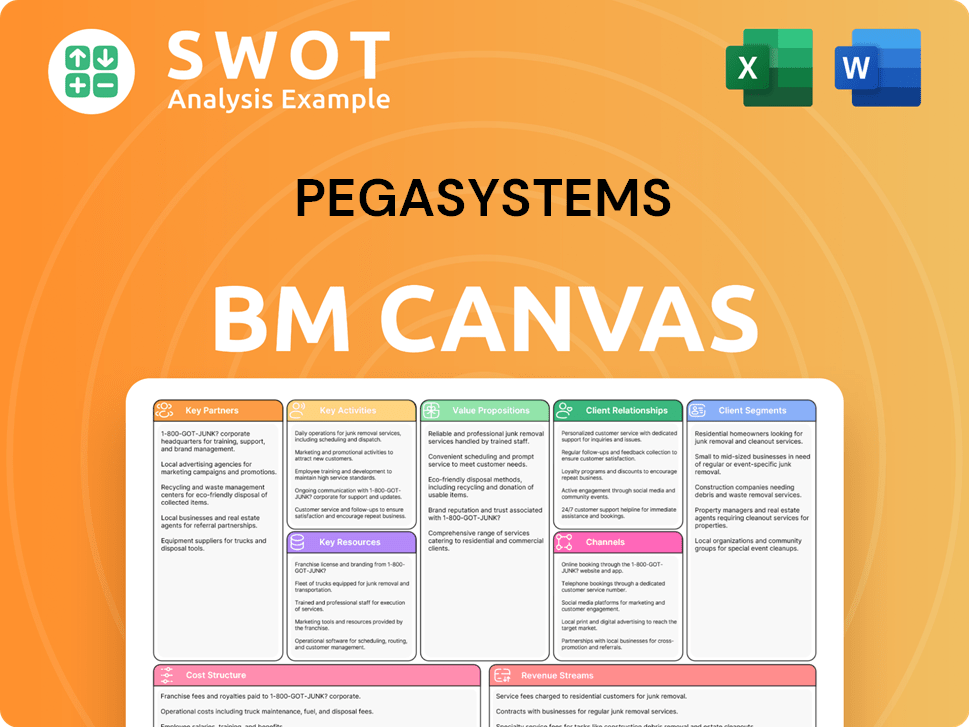
What Are Pegasystems’s Most Notable Campaigns?
The company's sales and marketing strategy incorporates a blend of large-scale events, targeted industry campaigns, and thought leadership initiatives to drive growth. A key component of their approach is the 'PegaWorld iNspire' conference, designed to showcase platform innovations and solidify the company's market position. This comprehensive strategy aims to attract new clients, reinforce customer loyalty, and highlight the company's expertise in digital transformation and AI-driven solutions.
Another significant element of the company's marketing strategy includes industry-specific campaigns. These campaigns are tailored to address the unique challenges and opportunities within various sectors, such as financial services and healthcare. By focusing on specific industry needs and demonstrating the value of the platform through case studies and quantifiable results, the company aims to generate leads and expand its client base. This targeted approach allows for a more focused and effective sales process, contributing to overall revenue growth.
These campaigns are crucial for the company's go-to-market strategy, as they directly influence lead generation and sales pipeline development. The company's ability to adapt and innovate in its sales and marketing efforts is critical to maintaining its competitive edge in the rapidly evolving technology market. The company's sales performance indicators are closely monitored to assess the effectiveness of these campaigns and make necessary adjustments to optimize results.
The annual 'PegaWorld iNspire' conference is a cornerstone of the company's marketing efforts. It serves as a platform for product launches, customer testimonials, and thought leadership. The event aims to showcase the latest platform innovations, attract new prospects, and reinforce customer loyalty.
Targeted campaigns are designed for specific industries like financial services and healthcare. These campaigns highlight how the platform can solve industry-specific challenges, such as improving customer onboarding and regulatory compliance. They often use case studies to demonstrate quantifiable benefits.
The company frequently collaborates with industry analysts and thought leaders to produce reports and webinars. This strategy boosts credibility and visibility within target markets. These efforts help to establish the company as a leader in the industry.
Extensive digital promotion through social media and industry publications is a key part of the company's marketing strategy. These channels are used to disseminate information about events and campaigns. This approach helps to reach a wider audience and generate leads.
The effectiveness of the company's sales and marketing approach is measured through several key performance indicators (KPIs). These metrics provide insights into the success of various campaigns and initiatives.
- Lead Generation: Monitoring the number of leads generated from each campaign.
- Pipeline Growth: Tracking the growth of the sales pipeline, indicating the progress of potential deals.
- Customer Acquisition: Measuring the number of new clients acquired as a result of marketing efforts.
- Engagement Metrics: Assessing the level of engagement at events like PegaWorld, including attendance and media coverage.
Pegasystems Porter's Five Forces Analysis
- Covers All 5 Competitive Forces in Detail
- Structured for Consultants, Students, and Founders
- 100% Editable in Microsoft Word & Excel
- Instant Digital Download – Use Immediately
- Compatible with Mac & PC – Fully Unlocked
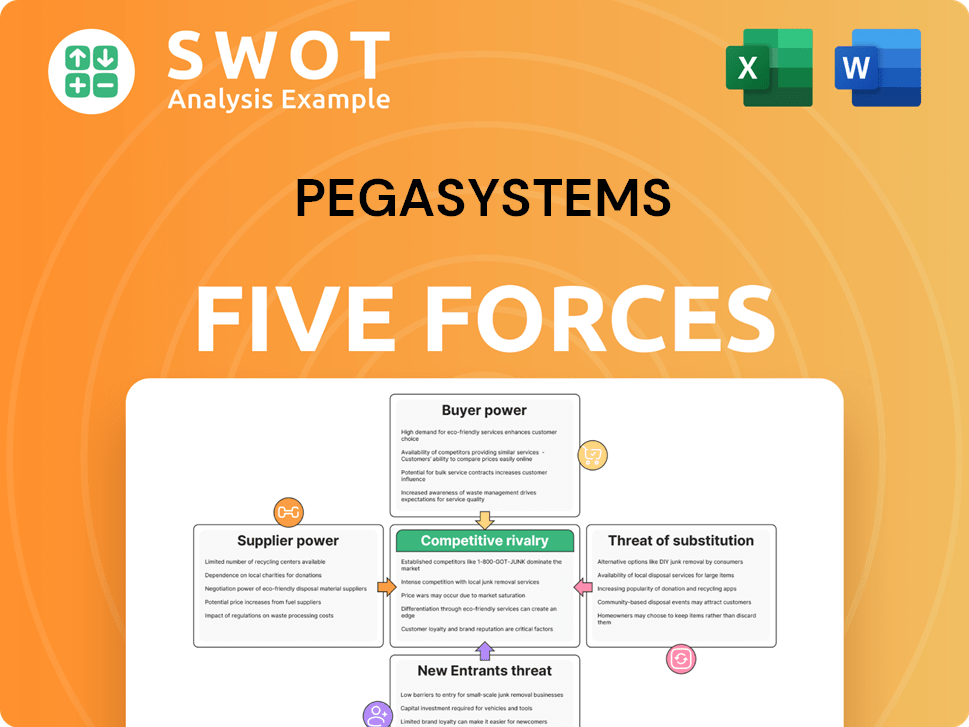
Related Blogs
- What are Mission Vision & Core Values of Pegasystems Company?
- What is Competitive Landscape of Pegasystems Company?
- What is Growth Strategy and Future Prospects of Pegasystems Company?
- How Does Pegasystems Company Work?
- What is Brief History of Pegasystems Company?
- Who Owns Pegasystems Company?
- What is Customer Demographics and Target Market of Pegasystems Company?
Disclaimer
All information, articles, and product details provided on this website are for general informational and educational purposes only. We do not claim any ownership over, nor do we intend to infringe upon, any trademarks, copyrights, logos, brand names, or other intellectual property mentioned or depicted on this site. Such intellectual property remains the property of its respective owners, and any references here are made solely for identification or informational purposes, without implying any affiliation, endorsement, or partnership.
We make no representations or warranties, express or implied, regarding the accuracy, completeness, or suitability of any content or products presented. Nothing on this website should be construed as legal, tax, investment, financial, medical, or other professional advice. In addition, no part of this site—including articles or product references—constitutes a solicitation, recommendation, endorsement, advertisement, or offer to buy or sell any securities, franchises, or other financial instruments, particularly in jurisdictions where such activity would be unlawful.
All content is of a general nature and may not address the specific circumstances of any individual or entity. It is not a substitute for professional advice or services. Any actions you take based on the information provided here are strictly at your own risk. You accept full responsibility for any decisions or outcomes arising from your use of this website and agree to release us from any liability in connection with your use of, or reliance upon, the content or products found herein.